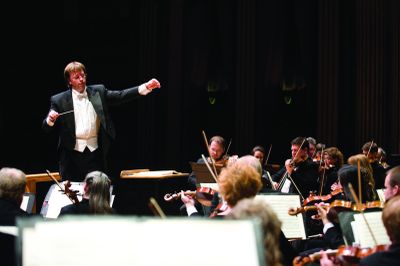No. 9 remains No. 1
Preu wraps up his fourth season with performances of Beethoven’s Ninth

When the words “Beethoven’s Ninth” are spoken, everyone knows it means Ludwig van Beethoven’s Symphony No. 9 – not his ninth string quartet or ninth piano sonata.
There are good reasons for that: It’s big, it’s bold, it’s difficult for performers, and it gives a thrill to audiences.
In short, it’s great – some say, the ultimate symphony.
Eckart Preu will end his fourth season as music director of the Spokane Symphony this weekend with performances of Beethoven’s Ninth on Saturday and Sunday at The Martin Woldson Theater at The Fox.
The orchestra will be joined by the Symphony Chorale and four soloists: soprano Mary Dunleavy, mezzo soprano Lucille Beer, tenor Eric Fenton and bass Richard Zeller.
To open the weekend’s concerts, the orchestra and chorale will perform Johannes Brahms’ “Schicksalslied” (“The Song of Fate”).
“I heard Beethoven’s Ninth every New Year’s Day when I was growing up,” Preu says. “It’s a tradition in Germany. And I sang it once when I was a choirboy. But I have never conducted a performance before.
“It’s a music director’s piece, and this is the first time I have ever been a music director rather than an associate or assistant conductor.”
The popularity of the Ninth creates problems for performers and audiences alike.
“It is one of those pieces you kind of know by ear,” Preu says, “But when you start studying the score, it’s so intricate, you find the things you didn’t know. And there are many, many of those.
“I love studying Beethoven because you can see the work, that labor of love, he put into his music. It’s love, but it’s still labor.”
Composers after Beethoven regarded the Ninth Symphony as a model. Wagner saw it as the end of the purely instrumental symphony. Brahms, in the rival camp, saw it as the monumental example to be awed by, and lived up to, among purely instrumental symphonies.
“The Ninth foreshadows so much of the music that is to come,” says Preu. “In the Ninth, Beethoven really carved the the path that music took far, far into the future.”
Every conductor seems to have tried to put a personal stamp on his performances of the Ninth.
“For decades, or even longer, there have been many great interpretations of this piece in all kinds of different fashions, more so than with any other composer or any other work,” Preu says.
“Everyone – soloists, every player in the orchestra, every singer in the chorus and especially the conductor – is challenged. It is like tackling a very big mountain. Everybody has to play at the top of the game in order to make this climb.”
One of the most famous performances of Beethoven’s Ninth occurred in Berlin on Christmas Day 1989. Leonard Bernstein led a program with musicians from East and West Germany, other European countries and the United States, celebrating the fall of the Berlin Wall that November.
At that time, the 19-year-old Preu was in Berlin serving the second year of his compulsory military service in the East German Army.
“Before being allowed to go to college, you had to go to the army,” he recalls. “I was supposed to do 18 months, but when the wall came down, they said, ‘Go home and do something with your life.’ ”
Preu’s life took him from Dresden to university in Weimar to the conservatory in Paris, then to the United States and eventually Spokane.
He will discuss the works on this weekend’s program one hour before performance time as a part of the orchestra’s Gladys Brooks Pre-Concert Talks series.